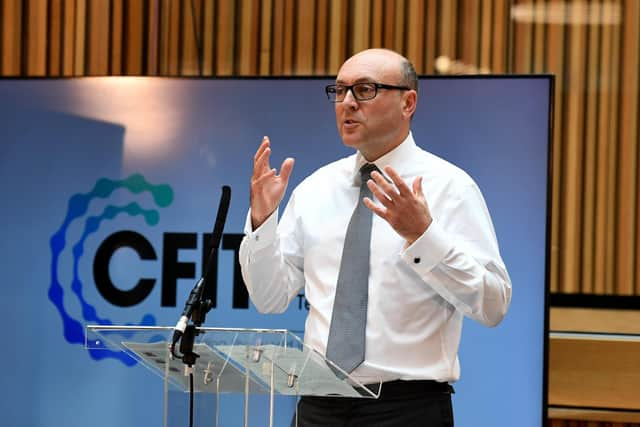What new centre of excellence for financial innovation means for Leeds: Andrew Griffith
It is the ability and willingness of individuals and firms to see technological transformation as a chance to reshape the financial services industry for the better that has made the UK fintech sector the truly fantastic success story that it is today.
With near-record investment levels, the ongoing conveyer belt of innovative product
Advertisement
Hide AdAdvertisement
Hide Adlaunches, and a growing positive impact on consumers and businesses alike, UK fintech is leading the way. Indeed, almost 90 per cent of Brits now use at least one fintech service to manage their money or to make payments.


It’s no wonder, then, that almost half of Europe’s fintech unicorns are based in the UK. And last year, UK fintech withstood difficult global conditions to continue to attract more investment than the next thirteen European countries combined.
And this success is spread across the UK, with notable fintech clusters in Glasgow, Belfast, and Cardiff, to name a few.
And, of course, in Leeds – where fintech now adds over £710 million to the local economy, a figure that has more than doubled in just three years. Right here – in the heart of Yorkshire - the sector now employs almost 8,000 people in high-skilled, well- paid jobs of the future.
Advertisement
Hide AdAdvertisement
Hide AdWe’ve got an incredible amount to be proud of. It’s a moment of celebration. But it’s more than that, because our history of success doesn’t guarantee it for the future.
Simply put, you can’t realise the benefits of innovation by looking at past glories.
That is why we are acting by launching a new national fintech centre.
It shows that we mean it when we say fintech is central to our vision for the future of the UK financial services sector as one that continues to sit at the forefront of technology and innovation.
Advertisement
Hide AdAdvertisement
Hide AdThat is why we asked Sir Ron Kalifa to lead an independent strategic review to examine how government, regulators, and industry can maximise the future growth of the fintech sector.
This week we’re marking two years since the publication of the Kalifa Review. And the government and regulators have now taken forward its key recommendations to ensure that the UK remains a world-leader in this space.
The central recommendation of the Kalifa Review was the creation of the Centre for Finance, Innovation, and Technology.
Backed by £5 million of government seed funding, and an additional £500,000 from our delivery partners at the City of London Corporation, our vision is for CFIT to act as a new centre of excellence for fintech in the UK.
Advertisement
Hide AdAdvertisement
Hide AdBut we know that government does not have the answers alone: industry leadership is crucial.
CFIT will be a private sector organisation, led by the experts and dedicated to delivering on its promise to fintechs, businesses, and consumers alike.
I truly believe that our approach – whereby government provides the launch funding for a private body – sets CFIT up for success in its core mission: to address barriers to fintech sector growth; to support the creation of high-income, tech-based employment, across the country; and to enable firms to achieve global scale, helping to widen access to financial services for people and businesses.
CFIT will do this by bringing together coalitions of industry experts from across the UK – business leaders, policy makers, and academics – to address the knottiest issues facing the sector.
Advertisement
Hide AdAdvertisement
Hide AdIt will not be a think tank or another talking shop, but a centre of action, coming up with the data, ideas, and solutions that can be scaled to unlock growth.
I want my mission to be about delivery, not just reviews. And that is exactly what CFIT will do: deliver, deliver, deliver.
Partnerships will be a particularly important way in which CFIT can offer tangible benefits to UK fintech.
We have seen the announcement of a partnership with the University of Leeds, which will see university students matched with exciting fintech work placements. This will give students a fantastic opportunity to learn on the job and develop lifelong skills while helping to build a talented workforce that can adapt to the challenges of the future.
Crucially, CFIT will deliver for the whole of the UK.
Advertisement
Hide AdAdvertisement
Hide AdThe new centre has also announced its plans to launch innovation hubs to boost growth in key, high-potential areas, such as Leeds, Edinburgh, and Birmingham. These will leverage the experience and expertise of our hubs to promote connectivity and coordination across all the nations and regions of the UK.
Andrew Griffith is Economic Secretary to the Treasury. This is an edited version of a speech given at the launch of CFIT in Leeds.